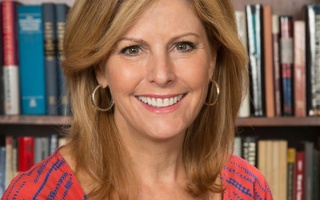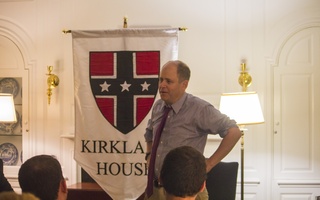Reforming election policies across the U.S. and modifying the way leaders are selected in Congress could help reduce polarization in American politics, according to a report co-written by Harvard Kennedy School Lecturer Elaine C. Kamarck and Brookings Institution Senior Fellow William A. Galston.
The report, released Wednesday and titled “The Still-Vital Center: Moderates, Democrats, and the Renewal of American Politics,” explores possible causes of polarization in American politics as well as measures that could be implemented to improve the situation in the aftermath of last month’s shooting in Tucson, Ariz.
“The shooting in Arizona got the country talking about the hostility in politics,” Kamarck said. “We are looking at some deeper structural causes for incivility in American politics.”
The study was commissioned by the Washington-based think tank Third Way in an attempt to launch dialogue among scholars about concrete ways to address extremism in American politics, said Anne Kim, the organization’s domestic policy director.
“I think this report is going to be a foundational document for a new movement inside American politics to fight against polarization,” Kim said.
According to Galston and Kamarck, one way to reduce extremism in American politics is to open primaries to all voters instead of restraining them to members of particular political parties.
“It would open up the possibility that moderation and compromise might be rewarded rather than punished,” they wrote.
The authors also suggest that modifying district boundaries would make districts less partisan, and that requiring a super-majority to elect Congressional leaders would favor cross-party collaboration.
Institute of Politics director C. M. Trey Grayson ’94, who worked on election programs when he was Kentucky Secretary of State, said he thought the authors came up with realistic propositions.
“Out of three, the open primaries is probably the most likely to happen. You’ve seen states gradually open their primary processes,” he said.
The report also examines moderates—who they say are an influential voting group—as part of a distinct political movement with specific preferences and characteristics.
“They are center-left on social issues, middle of the road on economics, and center-right on foreign policy. They are not ‘liberals in disguise,’ nor are they a ‘mushy middle’ of left-right compromise,” the authors write.
Grayson, a long-time advocate of bipartisanship in American politics, said that he agreed that in today’s polarized climate, the center has an increasingly important role.
“I thought their analysis of the importance of moderates was dead-on,” he said.
—Staff writer Ariane Litalien can be reached at alitalien@college.harvard.edu.
Read more in News
Harvard Professors, Students React to Congress' Cuts to Planned Parenthood FundingRecommended Articles
-
The Party-Line ConfederacyBut increasingly it seems that the needs of constituents have fallen on deaf ears to Washington leaders as party-line commitment now trumps the duty to hometown voters.
-
 William Galston, Bill Kristol Debrief Elections
William Galston, Bill Kristol Debrief Elections -
Obama: Time for ROTC to ReturnPresident Obama’s State of the Union address last night touched upon several issues that are likely to affect the University, including the Reserve Officers’ Training Corps, funding for science research and technology, and the DREAM Act.
-
Harvard Reacts to South Carolina PrimaryAs the 2012 Republican presidential contest unfolds, Romney’s position as the front-runner has been called into question following Newt Gingrich’s ...
-
 Nina J. Easton
Nina J. Easton -
 Jonathan Alter Shares Insight on Obama, Media
Jonathan Alter Shares Insight on Obama, Media













